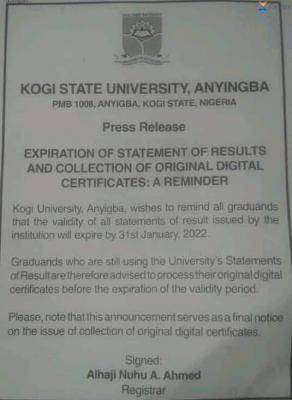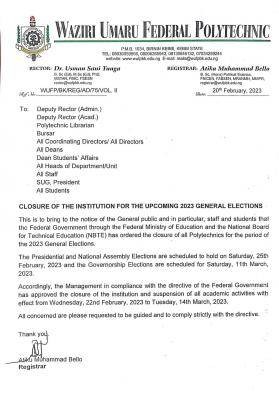
The 2013 edition of the Unified Tertiary Matriculation Examination (UTME) was last Saturday held in Nigeria and six other countries. But just like every other national exercise which has great economic impact, it becomes imperative to take stock of the sore points, challenges and prospects witnessed in the examination, which saw about 1.7 million candidates jostle for only 520,000 admission spaces in the nation's tertiary institutions.
The examination now categorized into three - Paper-Pencil Test (PPT), Dual-Based Test (DBT) and Computer-Based Test (CBT), saw the PPT and DBT held across 3,168 centres in 378 examination towns in Nigeria and six other countries, including Accra in Ghana; Buea in Republic of Cameroon; Cotonou in Republic of Benin; London in United Kingdom; Jeddah in Saudi Arabia and Johannesburg in South Africa. The Computer-Based Test (CBT) will commence on Saturday, May 18, 2013 and end on Saturday, June 1, 2013.
The examination body had said that all hands were on deck to make sure that everything went on smoothly as planned and warned candidates to adhere strictly to laid down rules and regulations. It also warned that anyone caught engaging in any form of malpractice would be made to face the wrath of the law, noting that men and officers of the Nigeria Police Force, the Nigerian Security and Civil Defence Corps and other security agencies were contracted to ensure adequate security.
How these assurances played out Saturday, leaves much to be desired after the exams which saw 1, 644, 110 of the 1, 735, 720, candidates, including 209 foreigners writing the examination.
With about 91,610 candidates expected to write the CBT exam kicking-off May 18, it becomes expedient to take stock of sore points of the last exams, while charting a way forward for the forthcoming CBT exam and subsequent UTMEs, if JAMB would survive the Steve Oronsaye Panel recommendation.
Oronsaye Panel recommended that it be made an administrative structure to set standards for minimum requirements on how universities in the country would conduct entrance examinations and have its powers divested to conduct matriculation examinations into tertiary institutions, while universities should be allowed to conduct their own entrance examinations.
An official of Nigerian Security and Civil Defence Corps screening candidates for the Unified Tertiary matriculation Examination at the African Church Grammer School Ita-Eko in Abeokuta, Ogun State, Saturday.
Sore Points
A visit to some centres in Ajegunle Lagos such as Express Secondary School, Mokoya Secondary School, Adeolu Secondary School and others, showed that the examination commenced behind schedule as officials battled with the challenges posed by the delay in capturing candidates' biometric data.
In other centres across the state, there were also incidences of shortage of question papers, exam malpractice by candidates as aided and abetted by officials, and confusion emanating from students who chose wrong subject combinations during registration.
For instance, there were cases of students who didn't register Literature-in-English, but want to study Law and other Arts/Humanities courses. This led to swapping of question papers, which consequently caused delay in centres.
Presumably, candidates like these may not come out tops in the exams. Similarly, candidates who failed to shade correctly their personal details such as surname, first name, middle name, registration number, centre and candidate numbers may also gnash their teeth when their results are released.
Before now, JAMB had warned candidates not to come to examination centres with gadgets such as phones, electronic scientific calculators, ipads, and other hand-held gadgets, but candidates who were bent on cheating in examination halls didn't comply with this directive. Investigations revealed that some candidates beat the scanning/detecting machines used by security operatives to prevent candidates from taking these electronic gadgets into the hall.
Some candidates purportedly removed their phone batteries and other hand-held gadgets, to beat JAMB's scanning/detecting machines. Similarly, as capturing candidates' biometric data became a problem, individuals popularly known as mercenaries who sat for the exan on behalf of some candidates, did what is known as superimposition i.e. scanning their passport photograph on the original candidate's own to beat officials.
There were also cases of mercenaries who uploaded their own passport photographs while registering their candidates, but usually other personal information of the candidates such as names, sex, state of origin, local government, address, age etc, are correct. On this passport photograph, especially during admission, the candidates claim that it was error made in cafes during registration. These sore points are perhaps beyond the powers of JAMB to detect.
Also, the examination started in Yewa Junior High School, Dairy Farm, Agege, Ikotun High School, Government Technical College, Ikotun and Igando Community High School, around 10: 00am, an hour behind official starting time.
When Vanguard visited some other centres in the state, some candidates were seen shortly before the commencement of the examination copying supposed answers from their cell phones into small sheets of paper, which they hid in secluded parts of their bodies including their private parts to beat security officers.
Also, some clever ones went into the examination halls with their cell phones making it easy for them to cheat. Our correspondent at Vetland Senior High School in Ifako-Ijaiye Local Government Area witnessed officials tackling the challenge of biometric screening of candidates within the scheduled time.
The chief examiner at the centre who simply identified herself as Mrs Olajide, had to announce to those affected and who had earlier been screened manually to go into classrooms with their examination numbers to settle down. While the exam was going on, she went round to announce that every candidate should ensure they had their biometric screening before leaving the exam hall.
"These are some of the candidates that the machine could not capture their data and we cannot continue to waste time on them. That is why I asked them to go in first while the officials will go round to do their biometric capturing later," she said.
There was also a situation of candidates not having all their subject combinations in one booklet and there were no leftover question papers across subject combinations.
Some candidates who had economics, chemistry and government as subject combination were affected.
The supervisors at some centres managed the situation by asking affected candidates to switch the question papers with those who had theirs complete pending when they would be ready to do them.
"And we're able to manage the problem with understanding," Mr. Yekini Olawale, a supervisor at Yewa Junior High School who teaches at Lagos City Polytechnic, said.
Schools like Excel College, Ronik Comprehensive School and Ejigbo High School, all in Ejigbo area of Lagos State were observed to have complied with the scheduled time for the examination, even as Kembry School, around Jakande area commenced by 10.00am, one hour after the scheduled time, owing to delay in capturing students' biometric data.
A survey of the centres revealed that the atmosphere was calm and devoid of chaos contrary to what was obtainable in some centres around the state, where there were cases of change of examination venues, which threw candidates into pandemonium.
At Excel College, a source said that the examination was "okay" and the venue peaceful. Another source, who revealed his identity as Jerry complained that he found the Chemistry questions "tough", Physics "bearable", and other questions "okay."
Asked about the centre, Jerry said the venue was peaceful and the examination started right on time. Deborah Augustine who wrote her examination at Ejigbo High School said that the centre was serene and devoid of any commotion.



